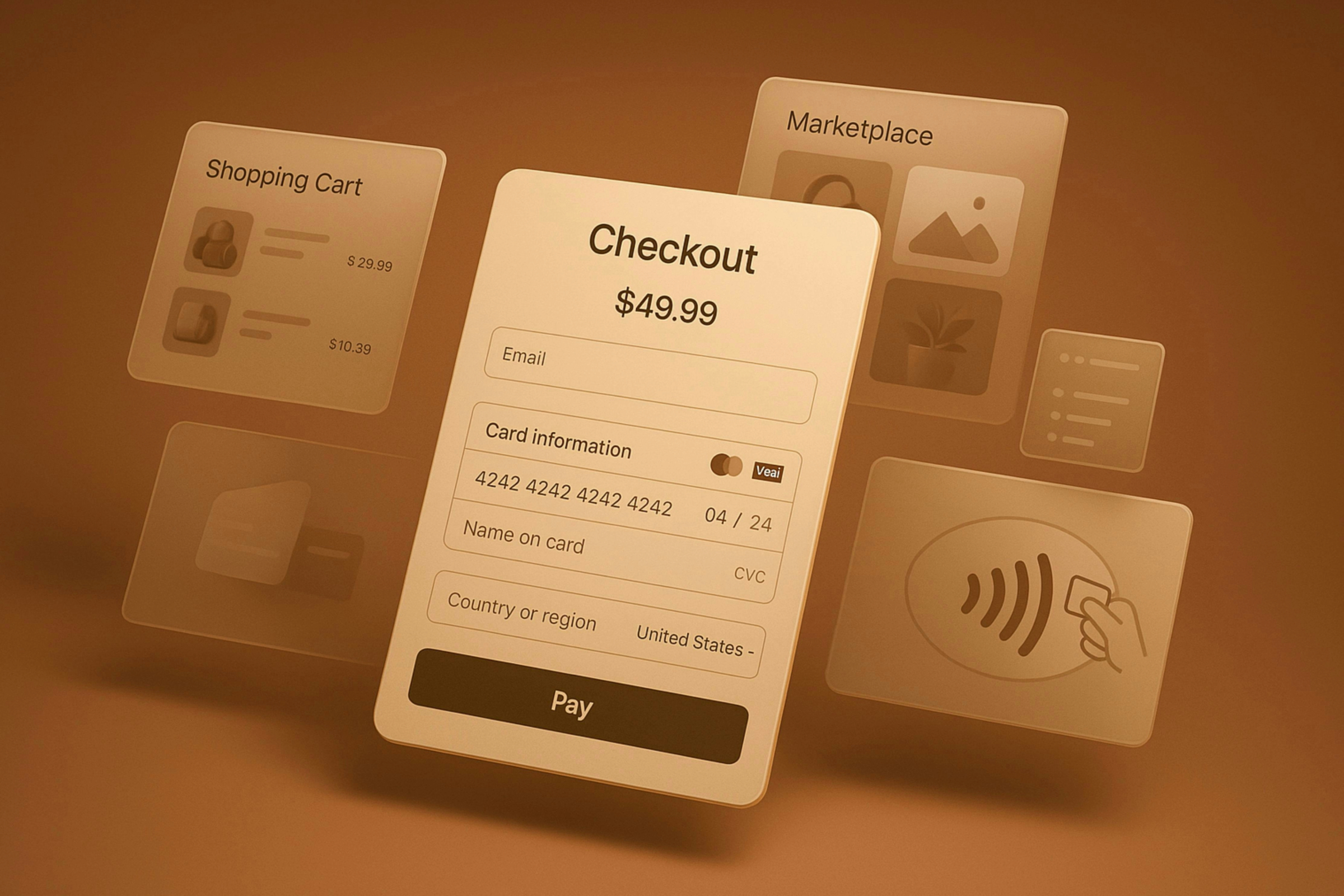Influencer marketing software has become essential for those brands who want to partner with creators that authentically match with their audience.
With the rise of social media, influencers have become a powerful driver of purchasing decisions. Unlike traditional advertising, which can often feel “too salesy,” influencer recommendations are trusted because they come from relatable voices.
This trust holds immense value for brands looking to connect with the right people in an authentic way. That’s where influencer marketing software steps in. A strong strategy today isn’t just about partnering with influencers; it’s about identifying the best matches for your brand’s style, tone, and values to maximize impact and ROI.
Whether you’re just starting or looking to optimize your existing strategy, these platforms will help you maximize your ROI and enhance your brand’s influence in the wellness space.Here’s a list of the top 10 influencer marketing software:
- Influencer Hero
- Captiv8
- Modash
- Aspire
- GRIN
- Upfluence
- Traackr
- CreatorIQ
- Sprout Social
- HypeAuditor
What Is Influencer Marketing Software?
Influencer marketing software is a tool designed to help brands better organize, manage and track all influencer efforts before, during and after campaigns.
Within these platforms brands can search, find, coordinate and measure influencer partnerships all in one place. Most influencer marketing software includes features such as:
- Creator Discovery: brands get to search and find influencers depending on noche, audience demographics, location, engagement rate and more.
- Campaign Management: Brands get to keep track of briefs, deliverables, content, approvals and deadlines.
- Outreach & CRM: brands get to streamline communication with creators and manage the relationship status in one place.
- Analytics: Brands get to measure sales, engagement, content performance and overall campaign ROI.
- Affiliate Links & Discount Codes: Brands get to generate specific links or codes to track each creator´ s conversions.
Top 10 Best Influencer Marketing Software
1. Influencer Hero
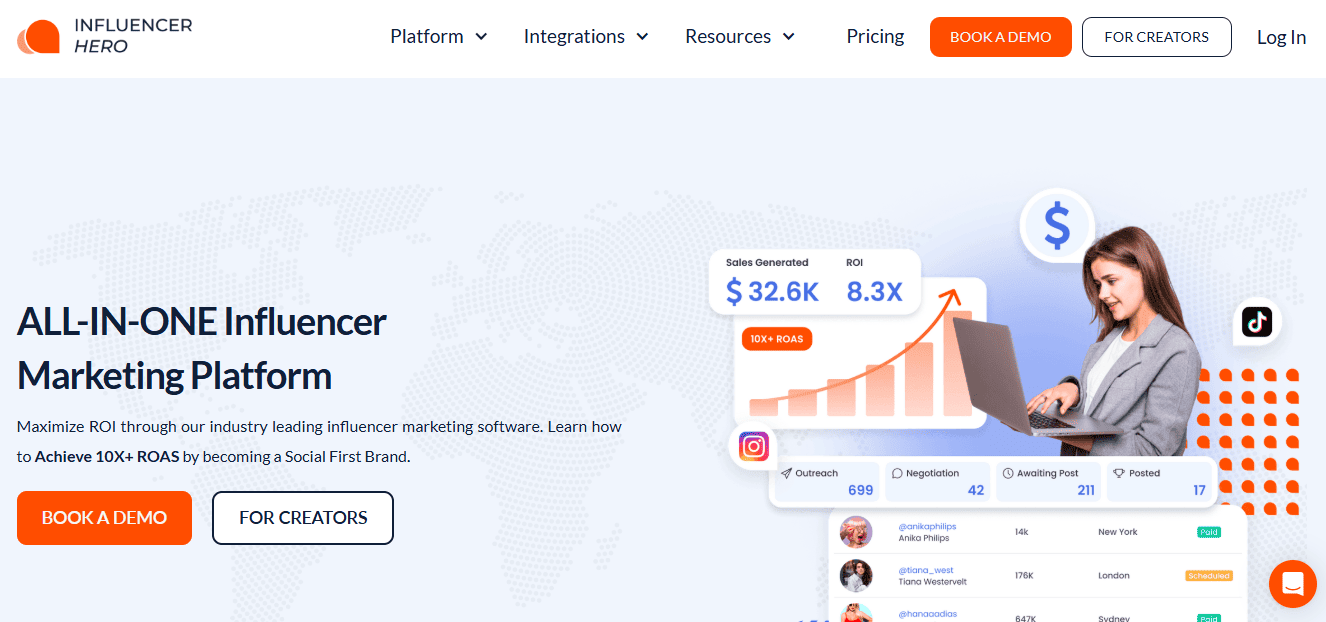
Influencer Hero is the all-in-one influencer marketing software that allows brands to scale campaigns. Is a great fit for brands ready to scale up their creator campaigns using automated and advanced tracking tools.
Even though the price can be expensive for smaller teams, the amount and depth of features and customer support makes it a good investment.
Platform coverage: Instagram, TikTok, YouTube, FaceBook, Pinterest, Snapchat, X (Twitter), Twitch.
Influencer Hero Standout Features:
- End-to-End Campaign Management: Unlike tools that only focus on influencer discovery, Influencer Hero centralizes the entire workflow—from finding influencers to managing outreach, contracts, content approval, and payments. This is especially useful for startups and D2C companies that want a single tool to replace multiple disjointed apps.
- Multi-Platform eCommerce Integration: Influencer Hero supports Shopify and WooCommerce. Also, the platform offers tracking scripts for other eCommerce platforms so any brand can monitor clicks and sales.
- Automates & Personalized Outreach: With Influencer Hero you can build different email sequences that feel tailored with multiple AI suggestions to improve engagement and response rates.
- Application pages & storefronts: Launch branded signup pages and creator storefronts to scale inbound interest and track affiliate sales.
- Chrome Extension For Real-Time Insights: Check engagement rates, audience demographics and creator’s growth as you browse social media and even add them to your campaign with one click or tap.
- Content & UGC Tracking: The platform automatically collects influencer-generated content and organizes it in one library, making it easy to repurpose across social media, ads, and websites. Brands running paid social campaigns benefit by having ready-to-use UGC for scaling their ads.
Pricing: Influencer Hero offers different plans depending on your brand’s needs.
- Standard Plan: Starts at $649/month. Allows you to contact up to 1,000 creators a month.
- Pro Plan: Starts at $1,049/month. Allows you to contact up to 5,000 creators a month.
- Business Plan: Starts at $2,490/month. Allows you to contact up to 10,000 creators a month.
- Custom & Agency: Custom pricing based on your brand needs.
Pros:
- All-in-One Platform: Manages everything from discovery to payments across 8 channels (Instagram, TikTok, Facebook, X, Twitch, Pinterest, LinkedIn and YouTube).
- AI Outreach and Automation: Enables personalized bulk messaging and automated campaigns for efficient creator outreach.
- Customer Support: Support is one of Influencer Hero’s stronger points, starting with personalized onboarding and dedicated account managers and 24/7 slack channel, plus a comprehensive help center with free resources for both brands and creators.
Cons:
- Higher Starting Price for some teams: Begins at $649 a month, which can be a hurdle for smaller or early-stage brands.
- No Built-In Paid Ad Whitelisting: Boosting influencer posts requires manual set-up outside the platform.
2. Captiv8
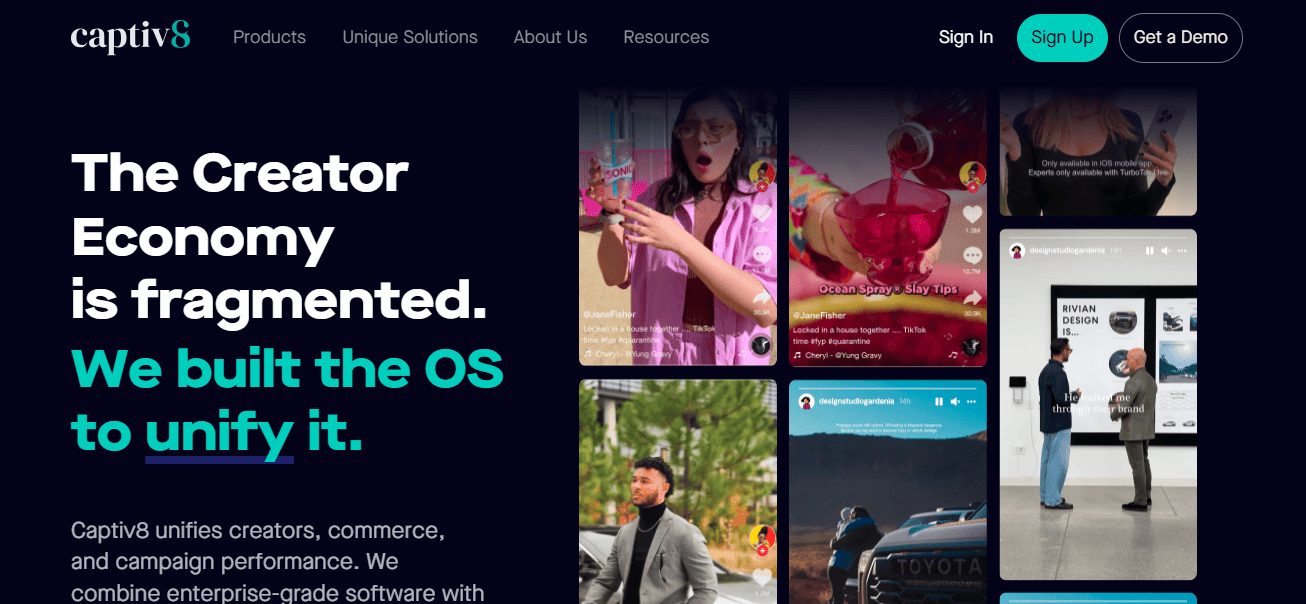
Captiv8 provides enterprise-grade software to run creator campaigns with confidence.
Is a powerful option for large brands that need enterprise-grade influencer discovery, social listening and AI-powered trend and safety tools.
Platform Coverage: Instagram, TikTok, Facebook, YouTube, Twitch, X (Twitter).
Standout Features:
- Influencer Discovery: Search across 15 million+ creators with advanced filters such as interests, location, and safety score to ensure suitability for your campaign.
- Global Brand Mentions: Track mentions of your brand or competitors across various platforms, including social posts, captions, and hashtags, to identify potential influencer partnerships.
- Customizable Reports: Build reports by dragging and dropping metrics and export them directly to Looker Studio or Google Analytics for deeper analysis.
- Campaign Tracking: Monitor campaign performance with detailed KPIs such as sales, engagement, ROAS, earned media value (EMV), and more.
- Storefronts & Affiliate Programs: Available for enterprise-level services, allowing creators to curate products and engage in affiliate marketing, with additional costs for integration.
Pricing: There are different pricing options:
- $25,000 annually (with an annual commitment only)
- $3,000 one-time onboarding fee
- $20,000-$30,000 per month for storefront + affiliate program (enterprise-level managed services)
Pros:
- Sentiment Analysis: Assess the sentiment (positive, negative, neutral) of creators and their content to ensure alignment with brand values.
- Competitive Intelligence: Identify creators already working with competitors and analyze global brand mentions.
- Team Collaboration: Tools for multi-campaign management with in-platform chats and approvals.
Cons:
- Poor Customer Service: Both brands and creators often complain about the slow response rates whenever there’s an issue.
- Limited Integrations: Only supports Shopify and Refersion, lacks broader integrations (e.g., Amazon, WooCommerce).
- Payment Issues: Reports of problems with payouts and deposits affecting creators and brands.
3. Modash
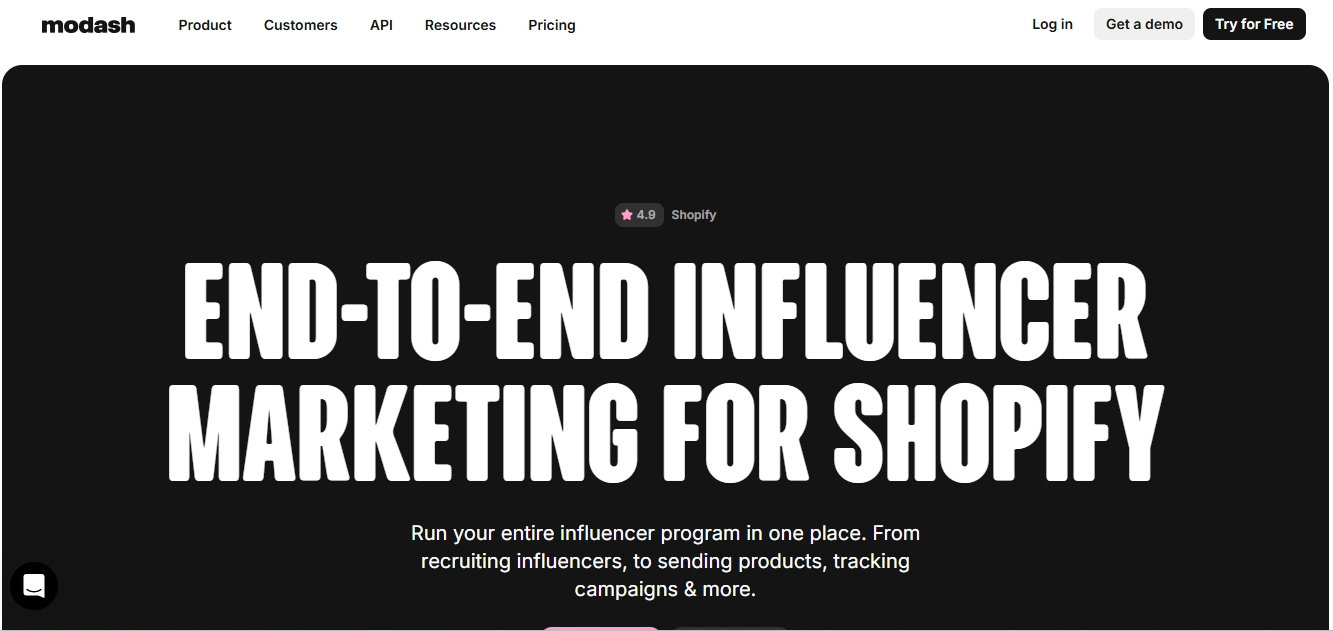
Modash is a fast growing tool that’s a great fit for small teams as it is affordable, simple to use and understand and strong on influencer audience analytics. It’s great for start-ups and teams who seek for data accuracy and a massive database.
Platform Coverage: Instagram, TikTok, YouTube.
Standout Features:
- AI powered creator discovery: You can use different text prompts such as "aesthetic fashion influencers in the US”, or upload a reference image to get highly relevant influencer suggestions.
- Find Your Fans Feature: The platform automatically identifies creators who are already following your brand and therefore are more likely to partner with you.
- Massive Creator Database: Because the platform is based on public data, they hold a database of over 350M profiles. This broad number of creators can be great for global campaigns.
- Real-time Campaign Content Tracking: All influencer content made around your campaign is collected and analyzed live.
- Shopify Centric Affiliate Automation: If your business runs on Shopify, you can manage all in one place. Set up gifting campaigns, creating discount codes and affiliate links and managing payouts.
Pricing: There are different plans and options.
- Essential Plan: Starts at $199/month (is paid annually). Allows you to contact up to 100 creators a month.
- Performance Plan: Starts at $499/month (is paid annually). Allows you to contact up to 250 creators a month and gives you access to the Shopify integration.
- Enterprise Plan: Custom pricing based on your brand needs.
Pros:
- Affiliate & Payout Automation: Supports commission tracking and monthly Shopify-based payouts.
- Performance Tracking: Real-time dashboards for engagement, affiliate sales, and content metrics.
- Advanced Discovery: Powerful filters, lookalikes, plus AI visual search by photo or vibe description.
Cons:
- Shopify-Only Gifting & Tracking: No integration with WooCommerce or other eCommerce platforms.
- No Content Licensing Tools: You must negotiate reuse rights manually with creators.
- Limited eCommerce Coverage: Beyond Shopify, gifting & sales tracking aren’t supported.
4. Aspire

Aspire is a great platform for mid-size to enterprise level teams. It provides an influencer marketplace plus automation, making it a flexible option for campaign scalability and structured workflows.
Platform Coverage: Instagram, YouTube, TikTok, Pinterest.
Standout Features:
- Dual Discovery Model: You can combine advanced creator searches with an inbound marketplace of over 1M influencers actively applying to your campaigns.
- Shopify Gifting & Affiliate Tools: you can generate promo codes, manage gifting carts, track affiliate sales and manage payouts all in one place.
- Comprehensive Workflow & CRM: With Aspire you can handle everything from contracts and briefs to automated follow-ups, content approvals and tracking.
- CreatorStores: You can enable influencers to build curated storefronts featuring your products, driving more organic conversions.
- Robust UGC Licensing: Built-in digital term sheets that secure reuse rights for ads or multi-channel campaigns.
Pricing: Aspire’s pricing generally works on tiered plans tailored to your brand’s needs, so costs may vary depending on your specific requirements.
- Essentials Plan: Starts at $2,299/month on a 12-month contract, totaling $27,588 annually, plus a one-time onboarding fee of $2,000, bringing the first-year investment to $29,588.
Pros:
- AI & Social Listening: Aspire uses AI to recommend lookalike creators and monitor who is already talking about your brand online.
- Exceptional Support: Dedicated implementation managers, client success teams, in-platform chat, and searchable help resources.
- Detailed Reporting: You can monitor impressions, engagement, clicks, sales and performance data. You can also export all this information with just a few clicks.
Cons:
- High Starting Price: Plans typically start around $2,000–$2,300/month on annual contracts, which can be a barrier for smaller brands.
- Small Platform Focus: Aspire is primarily optimized for Instagram, TikTok and YouTube with limited emphasis on other platforms like Twitch or YouTube that gather lots of users.
- Occasional Performance Issues: Some users report slow load times or minor integration hiccups.
5. GRIN

GRIN is a great platform to build and scale world-class creator programs. It is a strong choice for eCommerce brands looking for end-to-end influencer management. The platform works best if you also want seamless integration with Shopify.
Platform Coverage: Instagram, TikTok, YouTube, Twitch, X (Twitter), Snapchat.
Standout Features:
- All-In-One Stack Integration: GRIN seamlessly connects with tools like Shopify, Klaviyo, PayPal, DocuSign, Slack, Gmail and Outlook, gathering all your marketing operations into one platform.
- eCommerce Native: GRIN is designed for brands with large product catalogs, handling everything from product seeding to sales-based commissions.
- Dedicated Program Support: Optional Creator Strategists can help with onboarding, execution, and campaign optimization, acting as an extension of your team.
- Creator-Friendly Experience: Influencers get personalized dashboards where they get to access briefs, links and upload their content.
Pricing: GRIN offers different plans and pricing options. All of them require a minimum 12-month contract.
- Fixed pricing: Starts at $25,000/year (with monthly payment options available).
- Additional plans: Can range up to $10,000+/year depending on features and volume.
Pros:
- Strong eCommerce integrations: Direct Shopify, WooCommerce, Magento links let you auto-track sales, gifting impact, and affiliate performance
- Branded Application Pages: Lets influencers apply directly to campaigns, enhancing reach and opt-in recruitment.
- UGC Collection: Personalized portals for uploads, plus whitelisting for paid ad integration.
Cons:
- High Costs & Rigid Contracts: Typically starts at $2–2.5K/month with annual agreements, making it less flexible for small or growing teams.
- Performance Issues: there are plenty of reports of slow load times, site crashes and glitches with manual uploads.
- Support Challenges: Support team is inconsistent, especially when it comes to billing concerns.
6. Upfluence
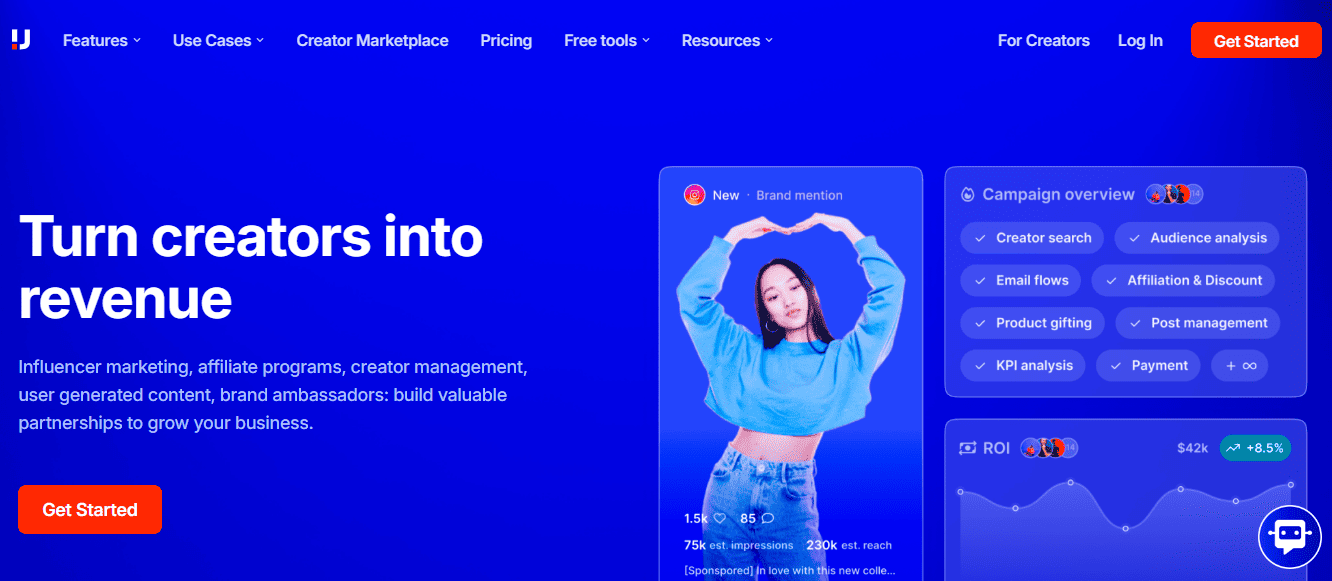
Upfluence helps you turn creators into revenue by building valuable partnerships to grow your business. It is the perfect platform for brands who seek powerful discovery filters and eCommerce integrations.
Platform Coverage: Instagram, TikTok, YouTube, X (Twitter), Pinterest, Twitch, WordPress.
Standout Features:
- Identify Influencers Within Your Customer Base: Thanks to Upfluence Shopify integration, the platform can analyze customer data to uncover which buyers are also influencers (typically 1%-3% of your list).
- Built-In Social Listening: With their social listening tool, Upfluence tracks conversations, emerging trends and high performing content related to your brand or competitors. This is a valuable asset for research and campaign planning stages.
- Leverage Past Collabs: With Upfluence you can easily import data from creators you’ve worked with before. Their latest analytics become accessible within the platform, allowing your brand to easily re-engage them in new campaigns.
- Ideal for Shopify and Amazon Sellers: Upfluence integrates seamlessly with Shopify and Amazon and manages to simplify affiliate tracking and connecting creators activity with sales performance.
Pricing: All plans are custom made, so you pay only for what you need and nothing else. There’s a minimum full year of service you have to commit to with monthly payments. On average plans start around $2,000/month ($24,000 yearly)
Pros:
- eCommerce Integrations: the platform integrates with Shopify and Amazon to track sales, affiliate programs and customer-influencer identification.
- No Commission Fees: Upfluence does not charge based on sales or outreach scale.
- All-In-One Solution: The platform combines influencer discovery, outreach, campaign management, tracking and payments.
Cons:
- High Cost and Annual Commitment: Costly and with limited contract flexibility. Annual payment only and no free trial.
- Limited Flexibility to Cancel: No cancel-anytime policies, users remain tied to the full-year payment.
- Complex Set-Up for Beginners: There are several features that may require a steep learning curve.
7. Traackr

Traackr is an influencer marketing platform that helps brands deliver growth with data-driven influencer insights. It is an analytics driven platform which makes them a great choice for enterprise brands looking for global campaign management and ROI measurement.
Platform Coverage: Instagram, TikTok, YouTube, Facebook, Pinterest, X (Twitter), Snapchat, Twitch, LinkedIn.
Standout Features:
- Brand Vitality Score: This unique metric blends visibility, impact and brand trust into one score, giving you a clear view of how your brand stacks up against the competition.
- Budget Calculator: Tracckr includes a built-in calculator that helps you estimate how much to invest in each creator by analyzing their historical performance data.
- Efficiency Metrics Dashboard: Evaluate cost-effectiveness with precision using key metrics like CPC, CPE, CPV, and cost per story view, giving you the insights needed to optimize influencer spend.
- Global Performance Benchmarking: Access industry-wide benchmarks from thousands of brands and millions of influencers to compare your campaign results by vertical, region, or format—helping teams identify gaps and growth opportunities.
Pricing: All plans are custom made, so you pay only for what you need and nothing else. Plans usually start at $32,500/year.
Pros:
- Global Reach: Traackr offers an extensive database of over 6M influencers.
- Full Lifecycle Management: Traackr combines influencer discovery, CRM, gifting, affiliate management and campaign reporting all under the same roof.
- Top-Tier Customer Success: The platform offers personalized onboarding, strategic consulting sessions and responsive support.
Cons:
- Steep Learning Curve: Advanced features can be overwhelming for some teams that will require more time to master.
- Pricing & Commitment: The entry price is elevated (around 32,500 yearly) and brands also must commit to a minimum full year of service.
- Limited Niche Coverage: May not include newer or niche micro-influencers in certain verticals.
8. CreatorIQ

CreatorIQ is a top-tier option for companies with complex influencer programs. The platform is strong on compliance, integrations, and large-scale database coverage.
Platform Coverage: Instagram, TikTok, YouTube, X (Twitter), Twitch, Snapchat.
Standout Features:
- Deep Data API Integrations: Get realtime API connected data from all major platforms to ensure your reports are always accurate and compliant.
- Branded One-Sheets & Live Approvals: You can review influencer profiles, check key metrics , preview content and collect stakeholder feedback.
- Strategic Support: You can count on dedicated implementation managers, onboarding process and quarterly planning sessions to keep your campaigns on track.
- Integrated Payment & Tax Compliance: You can handle creator payments directly in the platform with just one click with all the necessary documentation, making your finances easier to manage.
Pricing: There are different plans:
- Basic Plan: Starts at $35,000/year. Includes 1,000 contact creators per month
- Standard Plan: Starts at $50,000/year. Includes 2,500 contact creators per month
- Professional Plan: Starts at $90,000/year. Includes 5,000 contact creators per month
- Enterprise Plan: Starts at $200,000/year. Includes 7,500 contact creators per month
Pros:
- AI-Powered Discovery: The platform offers advanced filters plus AI audience matching and predictive brand fit for smarter influencer selection.
- Custom Dashboards: Fully customizable reporting with shareable live links.
- Direct API Integrations: Pulls real data from Meta, TikTok, and YouTube for more accurate metrics and early access to new features.
Cons:
- Manual Affiliate Tracking: There’s no automatic conversion tracking. All affiliate results must be entered manually.
- No Free Trial: There’s no free trial option and specific price tends to be shared after a demo.
Annual Contracts Only: There’s no monthly subscription model. Every plan requires a 12 month commitment.
9. Sprout Social
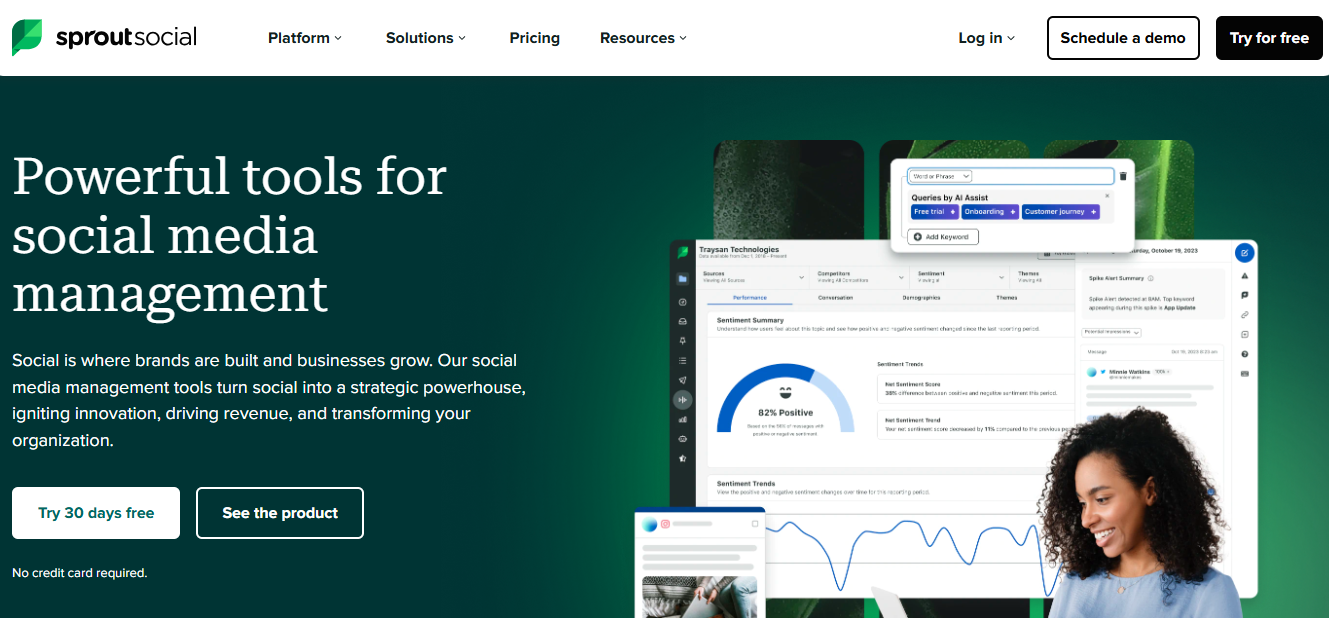
Sprout Social (formerly Tagger) works well for brands already in the Sprout Social ecosystem who want influencer marketing tied to social analytics. It’s a reliable mid-market option for campaign management and reporting.
Platform Coverage: Instagram, TikTok, YouTube.
Standout Features:
- Advanced Discovery Filters: Search creators by age, region, and engagement to find precise matches.
- Brand Fit & Safety AI: SproutSocial affinity scores on brand alignment help brands ensure strategic selections.
- Content Approval Workflow: Creators submit draft content within the platform for review before posting. This gives brands and oversight and final say before anything goes public.
- Competitive Benchmarking & EMV Reporting: The platform offers customized dashboards to compare performance with competitors with top-tier analytics like Earned Media Value in real time, audience insights and content approval metrics.
Pricing: Pricing varies depending on every brand's needs.
- Base Plan: Starts around $1,600/month per user plus $600 per extra user. You can pay monthly or annually, but a full-year commitment is mandatory. This translates into an annual investment of over $19,200 for one person or $25,200 for a team of two.
Pros:
- Integrated Outreach & CRM: You can use Gmail or Outlook templates to communicate with influencers and track all communications in a campaign board.
- Reporting: Brands get to access exportable EMV/engagement reports (PDF, PNG, JPEG).
- Payments & Gifting: Smooth product seeding and creator payments via Shopify + PayPal.
Cons:
- High Cost & Contract: Starts at $1,599/user/month with a 12-month minimum, no monthly plan option.
- Shopify Only: Gifting & affiliate tracking tied to Shopify; limited outside it.
- Limited UGC Licensing: No automated content rights management—handled manually.
10. HypeAuditor
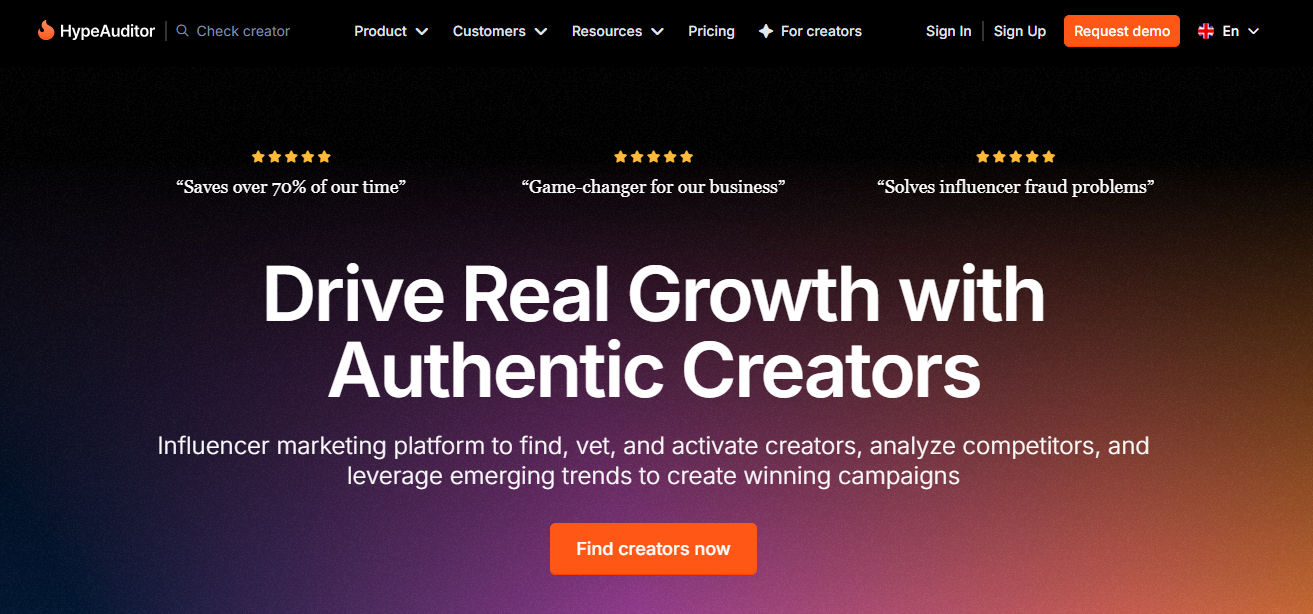
HypeAuditor is especially useful if you care deeply about transparency, audience authenticity, and fraud detection. For brands scaling up influencer work and wanting trustworthy data (especially across multiple platforms), its tools tend to justify the investment.
Platform Coverage: Instagram, TikTok, YouTube, X (Twitter), Twitch, Snapchat.
Standout Features:
- AI-Powered Discovery: The platform analyzes bios, captions and images to accurately categorize creators.
- Social Listening & competitor Tracking: Discover influencers already mentioning your brand or competitors, making it easier to build real partnerships.
- Flexible Campaign Management: You can handle everything from outreach to payments and reporting within the same platform. You also have eCommerce integrations that track promo codes and sales.
- Searchable Reporting: You can export reports as PDFs or share direct links with stakeholders, complete with eCommerce metrics like revenue and conversion rates by creator.
Pricing: HypeAuditor’s pricing is customizable, with the standard “Business” plan starting at around $10,000/year. Pricing can be adjusted based on the number of reports, active campaigns, and platform usage. They also offer a 24–48 hour free trial for new users.
Pros:
- Flexible Pricing: The platform offers a modular pricing structure and also a free trial window.
- Branded Application Pages: Brands can create landing pages for influencers to directly apply to their campaigns.
- Omnichannel Outreach: Reach influencers by email, DM, or through HypeAuditor’s integrated CRM—send briefs, contracts, approve drafts in one workflow.
Cons:
- Big Learning Curve: Due to extensive features, there’s an onboarding and training sessions needed to navigate effectively.
- Manual Reporting for Affiliate Metrics: Some features like affiliate reporting require manual input, which can be time-consuming.
- Limited Creator Database: Only 200K influencers are registered for direct applications, compared to the full 200M+ available in the broader database.
Final Thoughts
Influencer marketing works great because creators provide authenticity. Audiences trust them and their messages so brands partner up with them to deliver their own.
However, choosing the right influencer is not just about the amount of followers, as a brand you must find voices that fit your style, tone and values.
That’s where tools like Influencer Hero, Modash, Upfluence and more come in, helping you cut through the noise and connect with the right creators for you.
Big or small, every brand needs their match. So get out there, set your goals, pick your platform and start your influencer marketing campaign.




.jpg)



